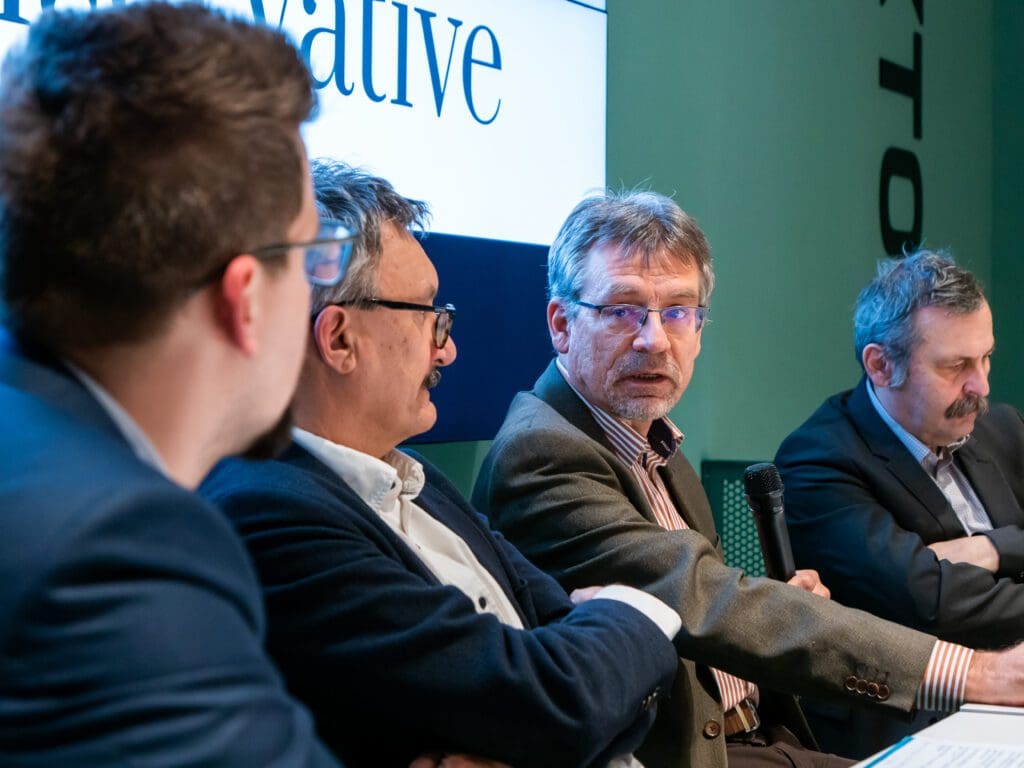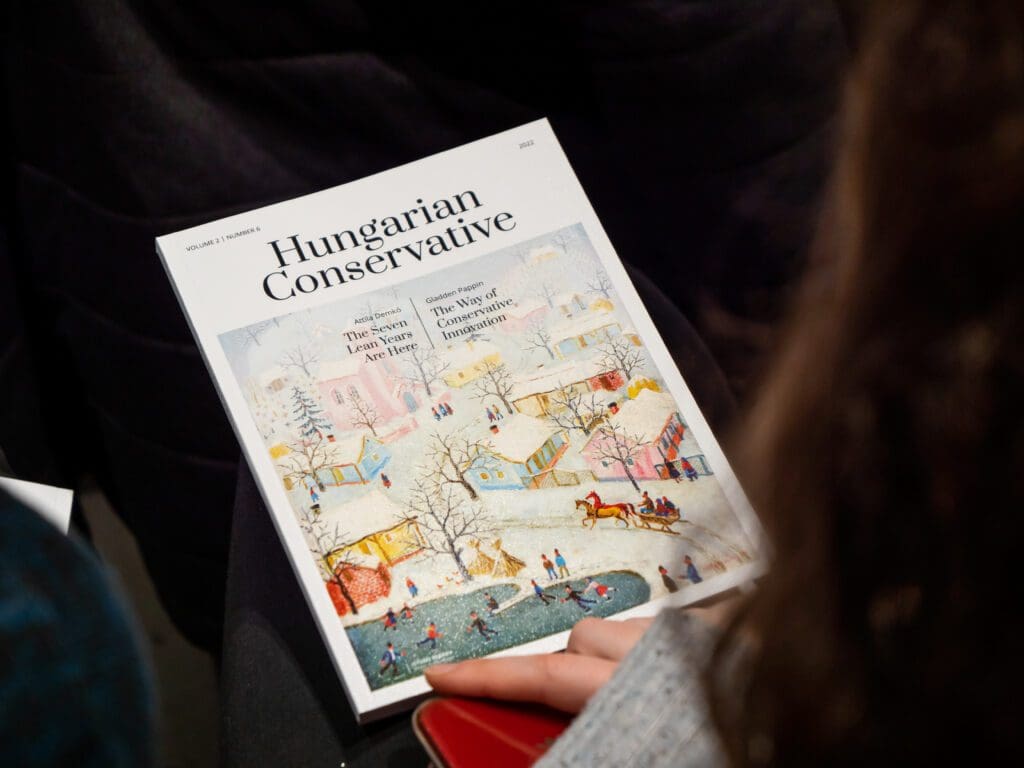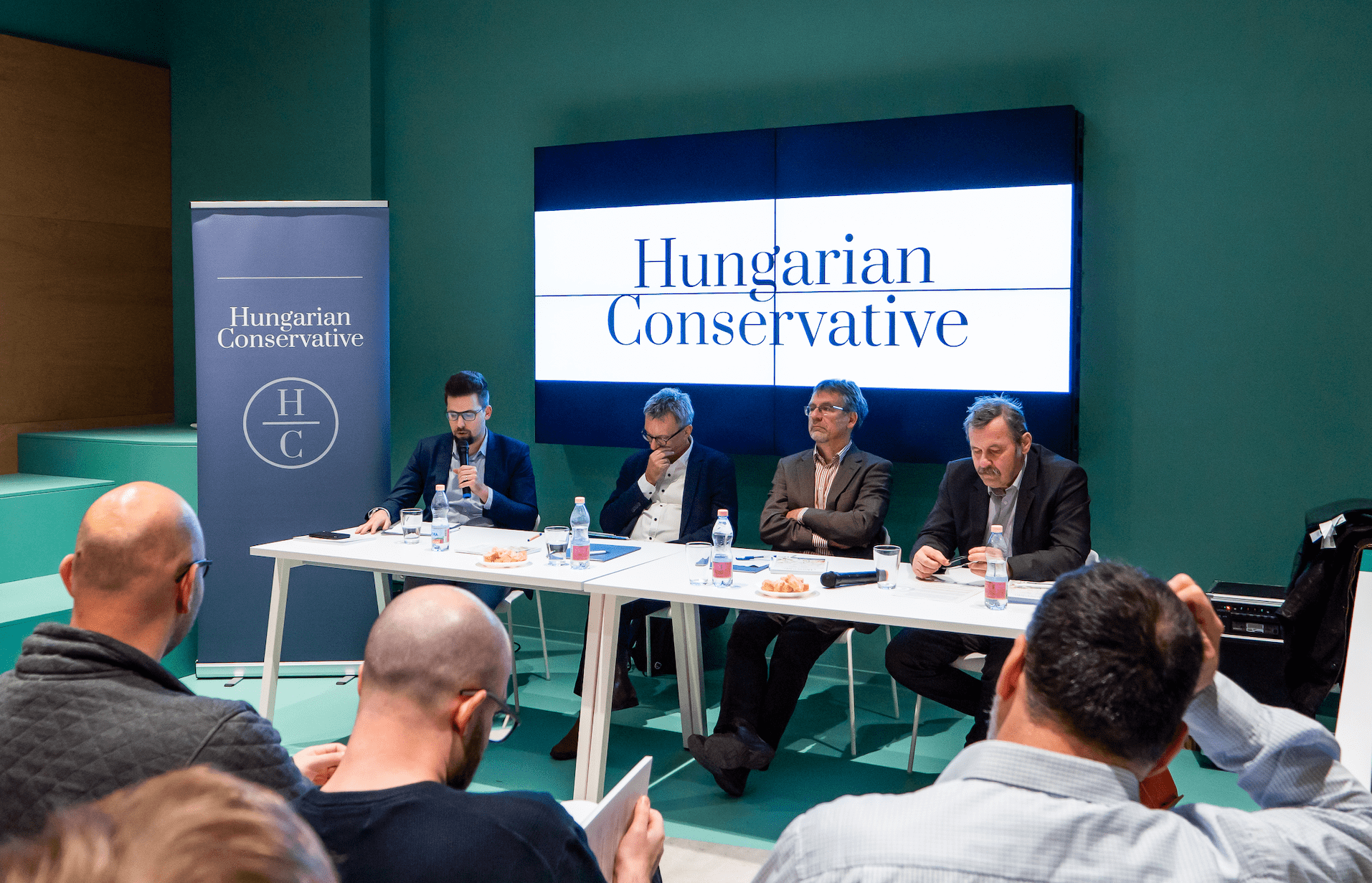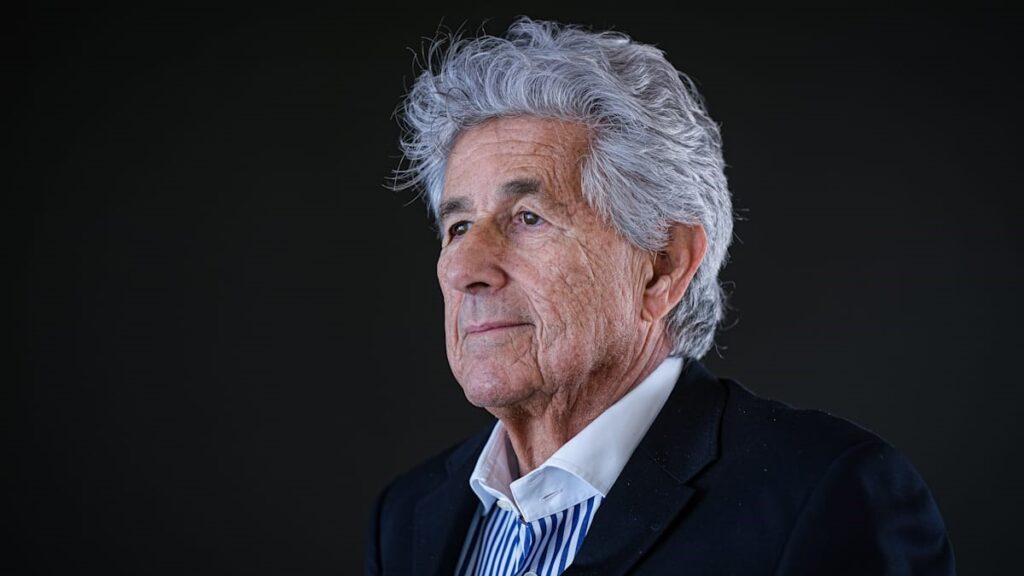At a debate hosted by Hungarian Conservative on 12 December, political scientist András Körösényi, conservative historian of political thought Attila Károly Molnár and political philosopher Ferenc Hörcher explored the relationship between conservatism and political reality, engaging in a thought-provoking debate that touched upon a number of issues from the definition of conservatism to the possibility of success of conservative politics.
By the time the event started, no seats were left empty. The moderator of the event, Danube Institute research fellow Ádám Darabos started the discussion by referring to an essay András Körösényi co-authored in 2019 and in which he described the basic tenets and values of conservatism as opposed to the philosophy of the ‘new right’. The moderator asked whether the speakers agreed that there were indeed such tenets and how they would define ‘conservatism’ .
Conservatism: a Mindset or Ideals?
The first answer came from the author of the said essay himself. He said that in his view, conservative values are rooted in 19th century classical liberalism, because at that time modern conservatives and liberals shared essentially the same ideas. Later, however, the classical liberal principles were included in the tradition of conservatism. He added that conservatism is an attitude, a way of thinking that stems from practices that have worked before and protects these practices.
Conservatism is opposed to radical changes—and is generally sceptical of them.
Best practices are upheld by conservatives, Körösényi argued, even if they do not always know why those practices worked. Conservative scepticism also has a moral foundation. A conservative believes that there should be no sovereign power, and even if there is one, it needs to be controlled. He added that conservatives view the idea of perfecting persons and institutions with a healthy amount of scepticism, noting that conservatives are basically anti-utopian. In terms of political conservatism, he said that one needs to thread carefully regarding changes to old constitutions and institutions. They might not be perfect, but they have worked, he stressed, reiterating that traditional ideas that work should not be sacrificed for the sake of a desired perfection. ‘We can see what happens when these ideas are discarded,’ Körösényi noted, referring to the New Right, a term he coined in his essay and which refers to the young generation of radical right-wing intellectuals who support the Orbán government.

He opined that while conservative values need to be re-evaluated and improved periodically, but this re-evaluation is not the job of the government or politicians. He noted that conservatism has a place in politics, but warned that the way politicians gather followers is largely different from the conservative ideal, as a conservative believes in action, not in—often empty—promises.
Ferenc Hörcher responded by saying that he agrees that the original values of conservatism were connected to classical liberalism, but stressed that liberal values are clearly not conservative values. He suggested that conservatism as such does not have specific values, since there is no such thing as ‘conservatism’. And even if there were, he added, it would not be based on values, but on attitudes, as conservatism is not an ideology. Hörcher noted that
his idea of conservatism is that it is based on three pillars: prudence, moderation and tradition.
These should be considered when talking about conservatism as a way of doing politics. The relationship between conservatism and political reality is quite difficult to describe, as politics is essentially not about values or theories, but revolves around solving practical issues, concrete problems, and in that process politicians are often forced to choose between bad and worse.
Molnár said that they have been having ‘discussions’ and sometimes ‘arguments’ with Körösényi for quite some time now, but in fact their views are not radically different. He noted, however, that he does not believe conservatism can be defined by listing core principles or tenets, as for instance American conservatives have attempted to do.
Molnár said he rather agrees with those who say conservatism is an attitude or mindset.
However, there needs to be a line drawn between what conservatism is and what it is not. He added that it is hard to describe or draw this line, but he believes that conservatives are those who call each other conservative, and conservatism is what those conservatives establish between them. But conservatism is constantly changing, so it cannot be described without placing it in a concrete space and time. There is not such thing however as a ‘conservative international’, because every conservative is rooted in his respective region. A conservative, Molnár added, defines himself in relation to his adversaries, and that also constantly changes depending on the time and the place. So conservatism is not something that can be really put into practice, that is why politicians sometimes run rampant. He reiterated that what conservatism means changes with time, and it has changed a lot in the last 30 years in Hungary as well. Another problem with defining conservatism by highlighting that it is rooted in tradition is that tradition itself is a difficult concept to define in modernity. What is certain is that a conservative is generally opposed to and criticizes modernity.

Körösényi replied by saying that he finds the idea that there is no such thing as ‘conservatism’ problematic. Identities may indeed be created in a process, and they are reactive, they are defined by what they oppose.
But conservatism is not just an attitude,
he argued, as there definitely are common factors that connect conservatives—it may be impossible to pinpoint concrete tenets of conservatism, but there are common features that connect conservatives, much like is the case of members of a family. Hörcher retorted that the issue he sees with the discussion is that Körösényi is trying to formulate what the ideal-typical conservative is like, but there might be no such thing. The idea of conservatives belonging to the same family with commonalities that run in the family is appealing, Hörcher conceded, but pointed out that even within in a family, there can be polar opposites, or there can be different streaks in the same family, so again, it is hard to claim that there is one ideal type of conservatism.
Can Conservatism as Politics Be Successful?
The next question of the moderator focused on was the feasibility of putting conservatism into practice. He remarked that it seems that conservatism does not translate into is a lot of success in politics, and wondered whether that stems from conservatism actually not being a set ideology.
Molnár said that he believes that there are types of conservatism that can be contrasted, for instance the New Right versus traditional conservatism. He remarked that success in politics is measured by how good a political party is at grabbing power, whether by way of a revolution, or through institutions.
Modernist politicians are able to mobilize more people because they can make promises that a conservative would never make,
because know they would be empty. In that sense, conservatives will always be the underdogs. Conservatives can mobilize people only though reflection on the failed attempts of progressive ideologies. Their handicap stems from the conservative mindset which essentially does not want to mobilize masses. However, Molnár remarked, this has changed in Hungary in the last 20 years. With Fidesz, the right achieved success in mobilizing people because there were a lot of failures suffered by the other side that they could use to their advantage.
Hörcher than said that even if we supposed that there are specific types of conservatism, they are not suitable for serving as guidelines in politics, but can be used in the intellectual discourse about conservatism. As far as political success is concerned, he said that conservatism worked well for example in the Anglo-Saxon world where it has been at least as successful as the left, if not even more so. He noted that the EU is different in this regard after 1945. There was a large shift toward left-liberalism until 1968, while now the woke wave dominates that in fact negates and annuls everything that liberalism is supposed to be about. In that sense, classical liberals today can be the close allies of conservatives—if there are still people who call themselves classical liberals.
Körösényi reacted by stating that it was not him who invented the ideal-types of conservatives, many had done that before him. As to the possibility of conservatism being successful, he agreed with the other two speakers, underscoring that conservatives will always seem to be losing, because they are essentially reactionary.
There is never a point of completion, a final goal achieved for a conservative.
But that actually provides an edge for conservatism, if contrasted with the raging left, which is literally helping the cause of conservatism with its extremities.
Molnár said that the question already implies that conservatism in politics is doomed to fail. But in reality, if success is measured in years of governance, Anglo-Saxon conservatives have been quite successful as they have won multiple elections. However, their critics say, and Molnár said he tends to agree with them, that while wining elections and governing, conservatives in the Anglo-Saxon countries, especially in Great Britain, may have sacrificed their conservative beliefs. According to Molnár, if there is a conservative essence or set of ideas, it is best grasped by the motto of the Hungarian government—God, homeland and family.
Hungary as an Example
The last topic the moderator asked the speakers about was Hungary being seen as a model by conservatives worldwide. He noted that there seems to be a conservative renaissance these days and wondered why Hungary is considered to be playing a central role in that.

Körösényi said that the reason why Hungary has become so prominent is because of globalization and the cultural war, as presented in the media. The success of Viktor Orbán stems from his strong radical and transformative political practices.
He has become a key figure in EU politics, because he shook things up.
In his opinion, Orbán has been elevated to his current position internationally also thanks to papers like the New York Times that have been writing about Orbán obsessively, painting him as the chief villain multiple times, and putting him on the covers of their magazines.
Molnár said that the Hungarian government took action on two issues that are important for a Western conservative: migration and gender. The West is excited to see Orbán go against the mainstream, which was the reason why he won the elections by a landslide both in 2018 and 2022. Molnár said while the Western media writing extensively about him may have contributed to Orbán becoming a central figure, but if he had not tackled those two issues he would not be where he is now.
Hörcher agreed with Molnár, adding that
Orbán realized that there are things one is not supposed to talk about, issues that are taboo.
He, on the other hand, has always been the kind of person who is not afraid to say what others dare not utter. Just as he did in 1989 in Heroes’ Square, in his famous speech about the Russians and the Communist needing to leave, now he is also unafraid to talk openly about things that were swept under the carpet before.








